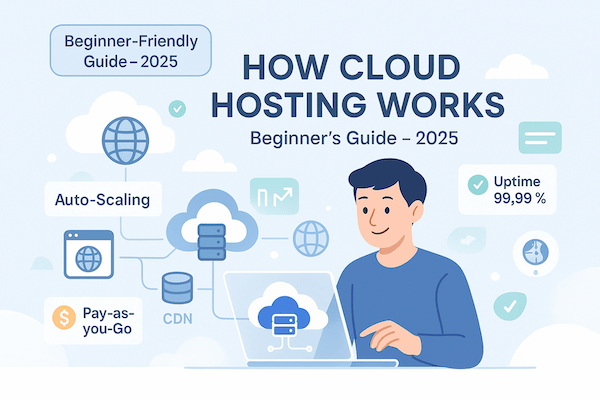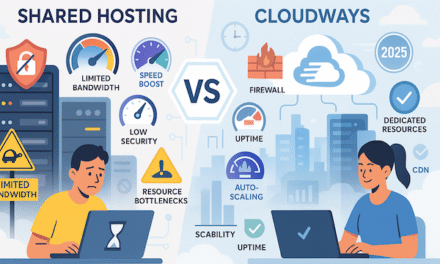Imagine your website could magically expand its capabilities whenever traffic surges, never crash during busy periods, and cost only what you actually use. That’s not magic—that’s cloud hosting in action. As we navigate through 2025, traditional web hosting is quickly being overshadowed by this revolutionary approach that’s changing how businesses manage their online presence.
If you’ve ever experienced the frustration of a slow-loading website, unexpected downtime, or surprise hosting bills, you’re about to discover why millions of websites are making the switch to cloud-based hosting solutions.
What Is Cloud Hosting? (The Simple Explanation)
Think of traditional web hosting like renting a single apartment for your website. You get a fixed amount of space, and if you need more room or better amenities, you have to move to a bigger place, which is time-consuming and expensive.
Cloud hosting, on the other hand, is like having access to an entire network of interconnected buildings. Your website can automatically use resources from multiple locations, expand or shrink its footprint based on needs, and never worry about being stuck in one place if something goes wrong.
In technical terms, cloud hosting uses virtualization technology to create virtual servers that draw resources from a network of physical servers across multiple data centers. Instead of your website living on one machine, it’s distributed across many machines working together seamlessly.
How Cloud Hosting Actually Works Behind the Scenes
The magic of cloud hosting lies in its sophisticated yet elegant architecture. Here’s how it works:
Virtualization: The Foundation
Cloud hosting starts with virtualization—a technology that creates virtual versions of physical servers. Think of it like dividing a large building into multiple apartments, where each apartment operates independently but shares the building’s utilities and infrastructure.
These virtual servers can be created, modified, or destroyed instantly based on demand. When your website needs more processing power, storage, or bandwidth, the system automatically allocates additional virtual resources from the available pool.
Distributed Network Architecture
Unlike traditional hosting, where your website files sit on one server, cloud hosting distributes your data across multiple servers in different locations. This creates several copies of your website’s files, ensuring that if one server experiences issues, others can immediately take over.
This distributed approach means your website is essentially “everywhere and nowhere” at once—a concept that provides incredible reliability and performance benefits.
Load Balancing and Traffic Management
Cloud hosting systems use intelligent load balancing to distribute visitor traffic across multiple servers. When someone tries to access your website, the system automatically directs them to the server that can respond fastest and has the most available resources.
During traffic spikes, additional servers automatically join the network to handle the increased load. When traffic subsides, unnecessary resources are released back to the pool, optimizing both performance and costs.
Cloud Hosting vs Traditional Hosting: A Clear Comparison
To understand why cloud hosting is revolutionizing web management, let’s compare it directly with traditional hosting approaches:
Scalability
Traditional Hosting: Fixed resources that require manual upgrades, often involving downtime and migration hassles. You pay for resources whether you use them or not.
Cloud Hosting: Instant scalability that adjusts automatically to your needs. Resources scale up during traffic spikes and scale down during quiet periods, ensuring optimal performance and cost efficiency.
Reliability and Uptime
Traditional Hosting: Single point of failure. If your server goes down, your website goes offline until the issue is resolved.
Cloud Hosting: Multiple redundant servers ensure virtually zero downtime. If one server fails, others immediately take over without any interruption to your website.
Performance
Traditional Hosting: Performance is limited by the physical constraints of a single server and its geographic location.
Cloud Hosting: Superior performance through distributed resources and global content delivery networks (CDNs) that serve your website from the location closest to each visitor.
Cost Structure
Traditional Hosting: Fixed monthly or annual fees regardless of actual usage, often leading to paying for unused resources.
Cloud Hosting: Pay-as-you-go model where costs align with actual resource consumption, making it more cost-effective for growing websites.
The Game-Changing Benefits of Cloud Hosting
1. Unmatched Reliability
Cloud hosting typically offers 99.9% or higher uptime guarantees. This reliability comes from redundant systems that ensure your website stays online even during hardware failures, maintenance, or unexpected issues.
For businesses, this translates to consistent revenue streams, better customer experiences, and improved search engine rankings (Google considers uptime a ranking factor).
2. Instant Scalability
Whether you’re launching a marketing campaign, experiencing viral content, or dealing with seasonal traffic fluctuations, cloud hosting automatically adjusts to meet demand. This means you never lose visitors due to slow loading times or server crashes.
Small businesses particularly benefit from this scalability, as they can start with minimal resources and expand seamlessly as they grow, without the traditional barriers of server migrations and lengthy upgrade processes.
3. Enhanced Security
Cloud hosting providers invest heavily in security infrastructure, offering features like:
- DDoS protection that distributes attacks across multiple servers
- Automated backups stored across multiple locations
- Advanced firewalls and intrusion detection systems
- Data encryption both in transit and at rest
- Regular security updates are applied automatically
4. Geographic Distribution
Cloud hosting can serve your website from multiple global locations simultaneously, reducing latency and improving loading speeds for visitors worldwide. This is particularly valuable for businesses targeting international markets.
5. Cost Efficiency
The pay-as-you-use model means you only pay for resources you actually consume. For many websites, this results in significant cost savings compared to traditional hosting plans where you pay for capacity you might never fully utilize.
Why Cloud Hosting Matters More Than Ever in 2025
The Digital-First Economy
2025 has cemented the digital-first approach across all industries. With remote work, e-commerce, and digital services becoming the norm rather than the exception, websites can no longer afford the limitations of traditional hosting.
Businesses that experience downtime or slow loading times lose customers instantly to competitors who offer seamless digital experiences powered by cloud infrastructure.
AI and Resource-Intensive Applications
Modern websites increasingly incorporate AI features, complex analytics, real-time chat systems, and interactive elements that demand significant computing resources. Cloud hosting provides the flexibility to handle these resource-intensive applications efficiently.
Mobile-First User Expectations
With mobile traffic accounting for over 60% of web usage in 2025, users expect lightning-fast loading times regardless of their location or device. Cloud hosting’s global distribution and automatic optimization deliver the performance mobile users demand.
Sustainability Concerns
Cloud hosting is inherently more environmentally friendly than traditional hosting. By sharing resources across multiple users and optimizing server utilization, cloud providers achieve better energy efficiency and reduced carbon footprints—a growing concern for environmentally conscious businesses.
Who Should Consider Cloud Hosting?
Growing Business Websites
If you’re experiencing steady growth in website traffic, cloud hosting eliminates the guesswork of capacity planning. Your hosting infrastructure grows alongside your business automatically.
E-commerce Stores
Online stores benefit enormously from cloud hosting’s ability to handle traffic spikes during sales events, holidays, or viral marketing campaigns without losing potential customers to slow-loading pages.
Content Creators and Bloggers
Whether you’re a blogger whose content might go viral or a content creator with a global audience, cloud hosting ensures your content is always accessible and loads quickly worldwide.
SaaS and Web Applications
Software-as-a-Service platforms and web applications require reliable, scalable infrastructure to serve users effectively. Cloud hosting provides the foundation for building robust, scalable applications.
Businesses with Variable Traffic
If your website experiences predictable or unpredictable traffic fluctuations (seasonal businesses, event-driven traffic, etc.), cloud hosting’s automatic scaling prevents performance issues and optimizes costs.
Popular Cloud Hosting Providers in 2025
Amazon Web Services (AWS)
The market leader is offering comprehensive cloud services with global infrastructure. Best for enterprises and developers who need advanced features and don’t mind a steeper learning curve.
Google Cloud Platform (GCP)
Known for superior performance and integration with Google services. Excellent for businesses using Google Workspace or requiring advanced analytics and AI capabilities.
Microsoft Azure
Ideal for businesses already using Microsoft products, offering seamless integration with Windows-based environments and enterprise tools.
Cloudways
A managed cloud hosting platform that simplifies cloud hosting for non-technical users while providing the benefits of major cloud providers like AWS and Google Cloud.
DigitalOcean
Developer-friendly cloud hosting with straightforward pricing and excellent performance. Perfect for small to medium-sized businesses and developers.
Making the Switch: What to Expect
Migration Process
Most cloud hosting providers offer free migration services, making the transition from traditional hosting seamless. The process typically involves:
- Backing up your current website files and databases
- Setting up your cloud hosting environment
- Transferring files and configuring settings
- Testing the new setup before going live
- Updating DNS settings to point to the new servers
Learning Curve
While cloud hosting offers more features and flexibility, many providers now offer managed services that handle the technical complexities for you. This means you can enjoy cloud hosting benefits without needing deep technical knowledge.
Cost Considerations
While cloud hosting might seem more expensive initially, the pay-as-you-use model often results in cost savings, especially when combined with the improved performance and reduced downtime that can impact your bottom line.
Common Myths About Cloud Hosting Debunked
Myth: “Cloud Hosting Is Too Expensive”
Reality: Cloud hosting’s pay-as-you-use model often costs less than traditional hosting, especially when you factor in the performance benefits and reduced downtime.
Myth: “Cloud Hosting Is Too Complex”
Reality: Managed cloud hosting services make cloud technology accessible to users of all technical levels, often with simpler control panels than traditional hosting.
Myth: “My Small Website Doesn’t Need Cloud Hosting”
Reality: Cloud hosting benefits websites of all sizes, offering improved performance, reliability, and growth potential, even for small sites.
The Future of Web Hosting
As we look toward the rest of 2025 and beyond, cloud hosting is becoming the standard rather than the exception. The integration of AI, edge computing, and serverless technologies is making cloud hosting even more powerful and accessible.
Businesses that embrace cloud hosting now position themselves for future growth and technological advancement, while those clinging to traditional hosting may find themselves at a competitive disadvantage.
Taking Action: Your Next Steps
If you’re currently using traditional hosting and experiencing limitations like slow loading times, frequent downtime, or difficulty handling traffic spikes, it’s time to consider making the switch to cloud hosting.
Begin by assessing your current hosting requirements, projected growth, and budget. Most cloud hosting providers offer free trials or money-back guarantees, allowing you to test their services risk-free.
Remember, the longer you wait to upgrade your hosting infrastructure, the more potential revenue and growth opportunities you might be missing due to poor website performance and reliability issues.
Cloud hosting isn’t just a technological upgrade—it’s a strategic business decision that can impact your success in the digital marketplace of 2025 and beyond.
💡 See cloud hosting in action. Launch your site with Cloudways in just 10 minutes — free trial included.





